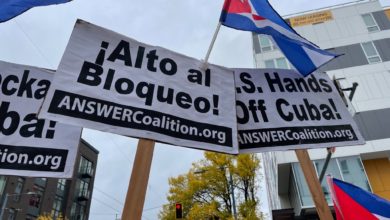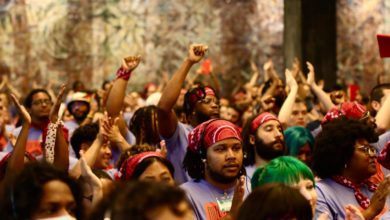Cuba is doing more than just surviving the U.S. economic blockade and the difficult legacy of the post-Soviet era. The Cuban revolution—the people and its leadership—has been actively engaged in a strategy for the last six years known as the “Battle of Ideas” to strengthen the socialist revolution.
 Cuba’s economy is expanding and returning to socialist norms of production. Photo: Bill Hackwell |
Among the latest efforts in the Battle of Ideas is a massive investment in health, education and cultural development as well as a revival of socialist economic methods. In addition, there is a major effort to combat corruption and theft of social property.
Underlying the battle is the Cuban economy’s accelerating growth. This growth has enabled the Cuban state to increase its role in the economy, for example in socialist norms of distribution, to benefit the workers as opposed to the small-scale entrepreneurs who gained immediately following the collapse of the Soviet Union.
Revival of socialist methods
Before its destruction in 1991, the Soviet Union provided essential economic support for the Cuban revolution. After 1991, Cuba was faced with severe shortages and economic disruptions. In the desperate struggle for sheer survival, the Cuban leadership was forced to resort to capitalist-style stimuli of the economy. But President Fidel Castro and other Cuban Communists always looked forward to the day when such reforms would cease to be a driving force of economic development.
That day has come.
Cuba’s gross domestic product grew 5 percent in 2004. The tourist industry grew by 7 percent.
This year, it is estimated that Cuba’s economy will grow by 9 percent. Unemployment has been reduced to a mere 1.9 percent.
With every economic gain, all relevant institutions are engaged in calculating how to reassert socialist economic measures, rather than the capitalist-oriented methods of recent times.
Beginning with a surprise notice to the world last May that the U.S. dollar would no longer be accepted as currency, a series of banking measures gave Cuba’s currency new strength.
Cuban bank account holders have voluntarily reduced their dollar holdings by 57 percent. Savings of the Cuban convertible peso grew threefold, and the national peso savings grew by 35 percent.
In the 1990s, the Cuban government had to implement income-generating reforms during the severe economic downturn in the wake of the Soviet Union’s collapse. Those included private employment, foreign investment, development of international tourism, remittances from families abroad, the introduction of the U.S. dollar and allowing unrestricted farmers’ markets.
The government and Cuban Communist Party made clear that the reforms were not building socialism per se, but were concessions aimed at reviving the economy in order to preserve socialist gains until such a time in the future when the country could return to the “building of socialism.”
On July 26, 1993, on the cusp of those economic changes, Cuban President Fidel Castro gave a major speech to explain this turn.
“We have to search for hard currency income, through different means we are doing that. [A] measure towards that objective is an opening to foreign capital investments. … We who were so doctrinaire and who fought so against foreign capital investment, see it now as an urgent necessity, with the disappearance of the socialist camp, from which we received factories, credits, a ton of things and from which we receive nothing now, not from a now non-existent socialist camp nor a Soviet Union. Nor do we receive anything from international financial institutions, which are all absolutely dominated by the United States.
“Now our country has a primary task, as we have defined it: … Today we have to save the Homeland, the Revolution and the gains of socialism which is the same as defending the right to continue building it in the future.”
Today, Cuba’s party—along with the mass organizations of workers, women and youth—is guiding the society towards the strengthening of socialism as the economy recovers.
Youth brigades fight corruption
Cuban President Fidel Castro has recently raised a thought-provoking question to the Cuban people: whether the Cuban revolution can be defeated internally from failure to guard against privilege and bourgeois influence.
“We have seen how heroic revolutions in great countries fell or collapsed precisely because of corruption, bureaucracy, lack of consciousness, bad methods of working with the masses and other failures,” Castro said in a Dec. 6 rally to commemorate the sixth anniversary of the Battle of Ideas’ launching.
The youth of Cuba are playing a principal role in the revolutionary renewal. Leagues of tens of thousands of newly graduated medical workers, art instructors and social workers are engaging all of Cuban society to strengthen socialist consciousness.
 A Cuban social worker helps fight corruption. Photo: Pastor Batista Valdes/Granma |
For instance, social workers—a new occupation requiring specialized training and a college degree—are organized into youth brigades to help people requiring assistance in resolving their problems. From the time they were first started in 2000, there are now 28,000 graduates of the social workers schools, along with another 7,000 currently studying in the schools.
The role of these youth organizations is to actively engage with people in their neighborhoods and homes, to survey and document the demographics of the population. They learn the specific issues facing each individual and family, especially in the poorer segments of the population, whether retirees, the unemployed, single mothers or children neglected by their parents. Then they help solve the problems at hand.
A recent national door-to-door survey by the social workers showed that 37,000 retirees were living alone and in need of personal attention. It led the government to decide that pensions were too low for seniors. Pensions were increased for all seniors, and 100 social programs were instituted.
Now the social workers are engaged in a new campaign: fighting against the theft of critical energy resources. Gasoline was being pilfered through bribes at gas stations, resulting in loss of state income for social spending. But exactly how much was not known.
Then on Oct. 10, in an innovative move, 10,444 social workers were dispatched to the gas stations of Havana and the provinces. The youth pumped the gasoline at 2,000 stations for weeks. They accompanied each delivery truck and monitored the refineries, keeping close watch on the precious fuel.
With the youth present, employees could not sell the fuel “under the table.” In two months of vigilance, the country’s income from gasoline sales more than doubled. The government is now instituting changes to keep closer control of the gasoline.
The social workers have become very popular. Coming primarily from working-class backgrounds, the young workers are seen as defending the interests of the people against the “new rich.”
“Just how many ways of stealing do we have in this country?” President Castro asked students at University of Havana on Nov. 17. “Why is it that we read every day in the opinion polls that people are asking about when the ‘kids’ are coming to the dollar stores, to the drugstores, or to all the other places? Everyone is full of admiration for these ‘kids,’ I mean the social workers, who came out of economically disadvantaged environments and are now highly prepared and trained.”
Castro: Don’t let the revolution fall apart
He explained one of the lessons that must be drawn from the collapse of the Soviet Union: that internal negligence can help lead to the disintegration of the revolution.
“I believe that the experience of that first socialist State, a State that should have been fixed and not destroyed, was a bitter one,” Castro explained. “You may be sure that we have thought many times about that incredible phenomenon where one of the mightiest powers in the world disintegrated the way it did; for this was a power that had matched the strength of the other super-power and had paid with the lives of more than 20 million of her people in the battle against fascism.
“Is it that revolutions are doomed to fall apart, or that human beings cause revolutions to fall apart? Can either humanity or society prevent revolutions from collapsing? I could immediately add to this another question: Do you believe that this revolutionary socialist process can fall apart, or not?” (Exclamations of: “No!!”) “Have you ever given that some thought? Have you ever deeply reflected about it?
“Were you aware of all these inequalities that I have been talking about? Were you aware of certain generalized habits? Did you know that there are people who earn forty or fifty times the amount that one of those [Cuban] doctors over there in the mountains of Guatemala … earns in one month? It could be in other faraway reaches of Africa, or at an altitude of thousands of meters, in the Himalayas, saving lives and earning 5 percent or 10 percent of what one of those dirty little crooks earns, selling gasoline to the new rich, diverting resources from the ports in trucks and by the ton-load.”
In addition to saving gasoline, an extensive program of replacing energy-sapping appliances like refrigerators and light bulbs is underway throughout the whole population. Small-scale private entrepreneurs like owners of the 12-seat “paladares” restaurants and others in self-employment will have to pay higher rates of electricity than workers.
The driving principle is that workers and retired workers must now be given priority as the bulwark of the socialist revolution.
During his Nov. 17 University of Havana speech, Castro commented on the 60th anniversary of his life as a revolutionary and the outlook of Cuba’s revolution:
“Those who work and produce will receive more, and they will be able to buy more; those who worked for decades will receive more and will have more. The country will have much more, but it will never be a consumer society. It will be a society of knowledge, of culture, of the most extraordinary human development imaginable, development in art, culture, science but not for chemical weapons, with a breadth of liberty that no one will be able to dismantle.
In another speech on Oct. 28, Castro said, “What those thousands of social workers, which are only a small, active part of the social workers we have, are doing is fighting to achieve Cuba’s economic invulnerability, and the principle they are striving to make a reality is the principle of giving the most to those who work, to those who receive a salary or a pension as workers in factories, professionals, teachers, doctors, workers in any walk of life. Yes, those should be the ones who benefit the most.”
Socialist consciousness
One fundamental difference between socialism and capitalism is that socialism must develop through consciousness and solidarity of the people—especially in an imperialist-dominated world.
Capitalist ideology still dominates and influences the working class and less class-conscious elements within the socialist countries. Societies like the United States may seem at first glance to be superior, with vast displays of wealth and unlimited advertising. But basic needs like education, health, housing, and jobs are increasingly unmet for tens of millions of people.
Former Eastern European countries and large parts of Soviet society were influenced by the siren song of capitalism in the 1980s. Cuba was expected to go the way of the socialist camp.
It was revolutionary consciousness, communist ideology and the conviction of the Cuban people and its leaders to defend socialism no matter the cost, which enabled Cuba to weather the anti-communist storm.
Cuba has emerged as a powerhouse of socialism, despite blockade, shortages and U.S. aggression.
The ability of the Cuban revolution to examine and solve the problems of the most vulnerable in society, to critique the shortcomings and fight privilege, are hallmarks that will guarantee its survival.
Articles may be reprinted with credit to Socialism and Liberation magazine.





